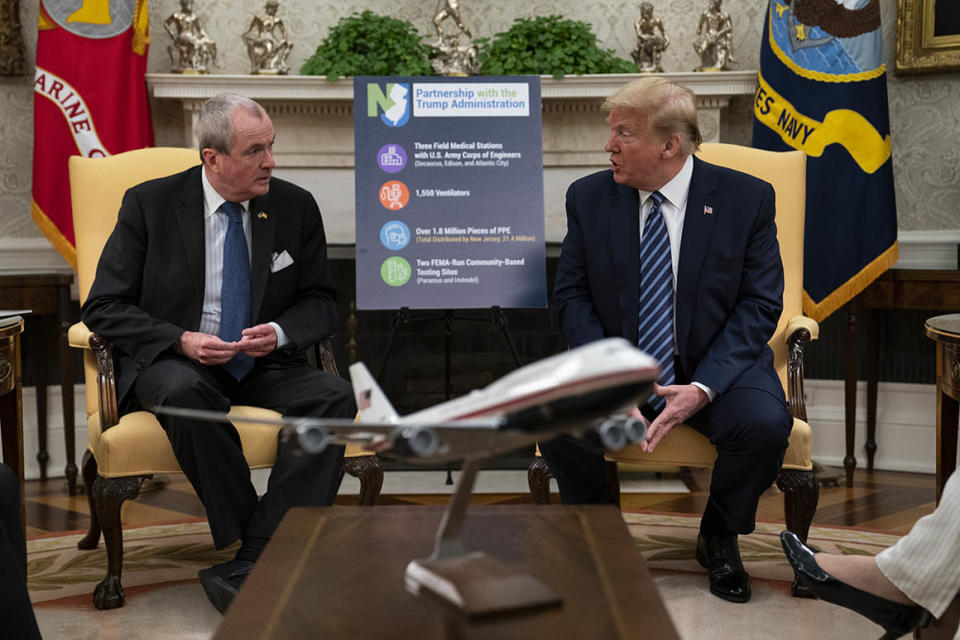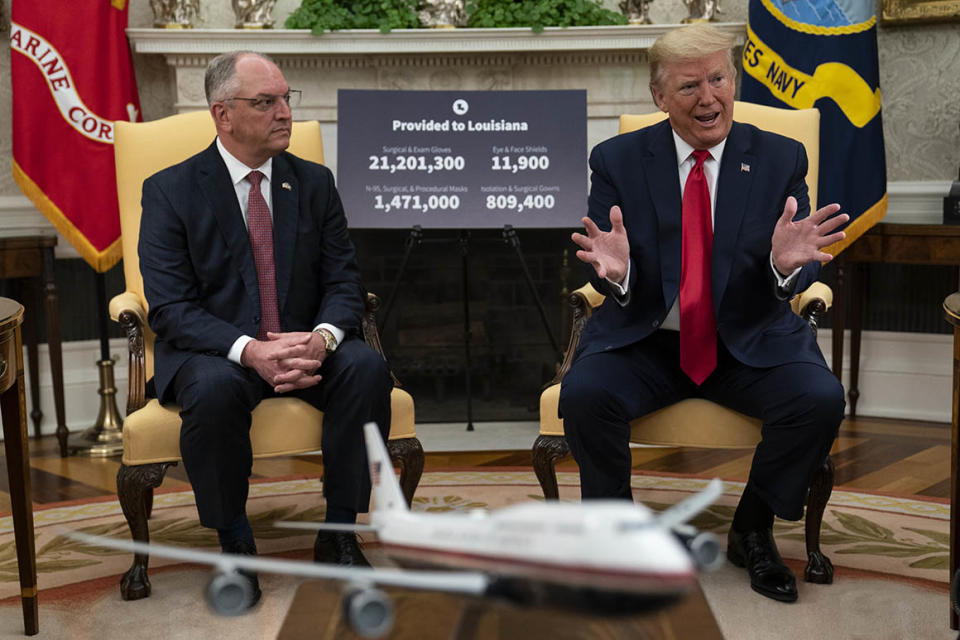Trump’s lockdown workaround: Bring the governors to him
President Donald Trump hasn’t been able to go out, so he’s welcoming governors in.
The visits are strikingly similar: Trump touts the governors as “special” and “great” and they in turn thank him for the “enormous help in our darkest hour of need.” The president cracks a joke or two about the governor getting a negative coronavirus test sitting down next to him. And then they all pose for the cameras.
The meetings — which sometimes border on comedy despite the serious subject — have served as Trump’s workaround to his inability to hit the road and hold rallies and promote the economic reopening of America, which he believes will be key to his reelection in November.
Instead, he’s getting the governors to come to the White House to do it for him. In just three weeks, Trump has met with one-fifth of the nation’s governors, including a brief jaunt to Arizona, where he met with Republican Gov. Doug Ducey and toured a plant making face masks. On Wednesday, Trump met with Democrat Jared Polis of Colorado and Republican Doug Burgum of North Dakota, lauding both for getting their states open. Mostly gone is Trump's war of words with governors, forfeited after some allies warned it could hurt his reelection. In its place? Mutual praise.
“We couldn’t be making the progress we’re making without you and your administration," New Jersey Gov. Phil Murphy, a Democrat, said during a late April Oval Office visit. "We thank you for everything.”

“I have to tell the truth," Trump reciprocated. "He’s something.”
The visits are expected to continue, according to a White House official familiar with the plans.
Jerry Brown, who repeatedly clashed with Trump while serving as a Democratic governor of California until last year, offered withering criticism of Trump’s response to the pandemic but acknowledged the good politics in what he's doing.
“If you can get Democrats to come and say nice things, and you can put it in your commercial it makes you look not a polarizer, but a unifier,” Brown said. “Obviously that’s Politics 101. Everyone likes to get the other side to say something nice about you. ... They will become content providers for the Trump campaign.”
They already have. Trump’s campaign has launched a digital ad featuring clips from Democratic governors praising Trump and released a video featuring both governors of both parties. It is posting praise on social media, too.
George Allen, a former Republican governor of Virginia who now serves on the conservative Heritage Foundation’s National Coronavirus Recovery Commission, said Trump and the governors may be playing politics but argued Americans want them to get along during times of crisis.
“What people don’t want to see is a bunch of sniping and petty politics going,” he said. “It’s in the interest of the morale of the people to show that unanimity of purpose.”
Trump has had to combat allegations that he initially downplayed the outbreak and failed to quickly produce and ship tests and medical supplies to states. Some of that criticism came from governors, who expressed frustration that Trump delayed deployment of the Defense Production Act, a Korean War-era law empowering him to order manufacturers to produce ventilators and protective gear. But other governors, including Democrats like Murphy and Gov. Gavin Newsom of California, have heaped praise on the president.
Now, as scores of states move to slowly reopen shuttered parts of the economy, Trump has put the onus on governors to lead the way.
The decision has placed governors in the public crosshairs. In some places, activists are staging protests against ongoing stay-at-home orders. But other governors are battling accusations they are putting public health at risk by restarting the economy too early.
Still, if state reopenings trigger a spike in infections or even a second round of lockdowns, Trump risks getting blamed for not doing more. America has now confirmed at least 1.4 million coronavirus cases, with more than 80,000 people dying from the disease.
"Decision-makers will be praised or blamed depending on how their decisions work out — that's just how it goes,” said Tim Pawlenty, a former Republican governor of Minnesota. “Beyond closing/opening decisions, many other decisions have also been pivotal in this crisis — so there will be no shortage of things for which decision-makers will be held accountable"
Trump, who urged states to begin reopening this month, began inviting governors at the forefront of those efforts to the White House in late April. More than 40 states have announced or begun plans to restart their economies, even though most have failed to achieve the benchmarks the White House said states should meet before relaxing social-distancing guidelines.
In his limited travel capacity, Trump is also expected to visit governors on their turf, roughly one per week. The trips are expected to highlight workers helping in the coronavirus response efforts. The president’s most made-for-TV excursion will come July 3, when he plans to visit Mount Rushmore and meet with South Dakota Gov. Kristi Noem, a Republican.
In a statement, the White House ignored the sharp words Trump has had for various governors during the coronavirus pandemic, saying the administration has been working with governors and their teams since January on a “whole-of-government response,” including ensuring supply chains, expanding testing, crafting data-driven guidelines for social distancing and now facilitating a responsible plan to open America again.
“The ongoing response to this global pandemic has been about close coordination and partnerships with state and local governments,” said White House spokesman Judd Deere. “President Trump has taken an unprecedented approach to communicating and working with our nation’s governors to guarantee they have the resources they need and the ability to make the best on-the-ground decisions.”
Through Trump's meetings with governors are ostensibly about coronavirus, they often veer into other topics. In his meeting with Louisiana Gov. John Bel Edwards, a Democrat, Trump congratulated him on Louisiana State University’s national football championship. The two even took the time to call the team's coach, Ed Orgeron.

Jim Hodges, a former Democratic governor of South Carolina, said it probably isn’t the best use of the governors’ time to visit the White House. But he conceded there's a good reason for governors accept the invitation: They often rely on Trump for supplies.
“The governors ... recognize access to personal protection equipment and to some of the federal aid that will be necessary to both deal with the health crisis and rebuild their states is in the hands of the administration,” he said.
Many governors have earned higher marks than Trump for their coronavirus response. A majority of Americans approve of the way their governor has handled the outbreak — 71 percent in a new poll this week — while less than half approve of Trump’s response. But some Republican governors who are pushing to reopen their states received lower marks, according to a new Washington Post-Ipsos poll.
Trump has tried to take credit for the poll numbers.
“Remember this, every Governor who has sky high approval on their handling of the Coronavirus, and I am happy for them all, could in no way have gotten those numbers, or had that success, without me and the Federal Governments help. From Ventilators to Testing, we made it happen!” he tweeted Tuesday.
“In normal times, governors want to go to the White House to bask in the glory of the president,” said Gray Davis, a former Democratic governor of California. “The opposite purpose may be at work here.”
Trump's relationship with the country's governors has zigged and zagged repeatedly over the course of the coronavirus outbreak.
In the initial weeks, the president rebuked governors over their requests for medical supplies and tests. He even accused them of hoarding ventilators. He said he told Vice President Mike Pence, the leader of the White House coronavirus task force, not to call governors if they were not "appreciative" enough of his efforts.
Trump also initially declined to invoke a national shutdown, deferring to governors on decisions about schools, businesses and medical facilities. He eventually issued nonbinding social-distancing guidelines but only after several large states, including New York and California, had already acted.
Then, as he pushed the country to restart the economy, Trump declared that he could make decisions on when states should lift their shutdown orders. But after a backlash, he quickly reversed course and said they would determine when to open.
But he continues to walk a fine line between giving up control and insisting he is the ultimate decider.
“If we see something wrong, we’ll call them out and we’ll stop it. But we are leaving it up to the governors,” Trump said this week at a White House briefing. “Some are being not aggressive enough, in my opinion, and some are being a little bit aggressive but they’re being very careful.”
Trump singled out one of those governors this week. He admonished Pennsylvania Gov. Tom Wolf, a Democrat, for delaying reopening parts of the state.
So when Trump makes a brief visit to Pennsylvania on Thursday, Wolf is likely to be the one governor who doesn't get a Trump meeting.
Sam Sutton contributed to this report.

